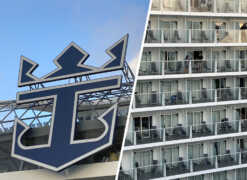Like any job, salaries for cruise ship workers range depending on roles and responsibilities, as well as experience. With that said, employees typically earn between $1,200 to $3,500 per month before bonuses and tips.
Where an entry-level cabin steward and other basic service roles are at the lower end of the pay scale, senior officers and specialized staff can have annual salaries that get into six figures, especially when they work for the premium cruise lines. Let’s take a look at how it all breaks down.
In This Article:
Average Salary of a Cruise Ship Worker
Typical monthly pay for cruise ship workers falls in the $1,200 to $3,500 range, though averages vary widely by role, cruise line, and contract duration. Across the entire industry, the current annual cruise ship worker salary is $49,000, or about $24 per hour.
Keep in mind that employee compensation on a cruise ship is a little different from what it is for most jobs. For starters, there is a huge variety of roles, and the contract nature of the work differs from most land-based jobs.
Princess Cruises Crew Members (Photo Credit: Erin Cadigan)
For most entry-level service roles on the ship, such as restaurant wait staff, cabin stewards, laundry services, and deckhands, employees are given a modest base pay, but their wages are supplemented with tips.
Like any job, those that require specialized and technical skills pay significantly more, which is why the salary averages for the entire industry can be so deceptive. On top of that, many salary figures consider the corporate shore-staff when calculating cruise ship worker salaries.
The Contract Nature of Cruise Work
Assessing annual salaries for cruise ship workers can be challenging, as most employees are hired on working contracts that typically last 6 to 8 months.
This tends to concentrate annual earnings into chunks of months, rather than being measured by year, like a typical salary. This is also why cruise ship worker salaries can look somewhat modest compared to the salaries of similar land-based positions, like hospitality jobs.
If you take hospitality staff, for example, the current average annual wage in the USA is $51,465, which is noticeably higher than the average for cruise ship staff that hold similar jobs.
Crew Members Chatting on the Open Deck (Photo Copyright: Cruise Hive)
While figures like this make it seem like cruise ship staff are underpaid, this can be somewhat misleading. Remember, most cruise ship staff are only working 6 to 8 months out of the year, so that $49,000 average salary is earned over fewer months.
Plus, there are even more short-term contracts, where employees are paid per voyage or per sea day, rather than by the week, month, or year, which actually takes me back to my own past experience as a cruise ship worker (I’ll get to that shortly).
Most cruise-based jobs also have additional perks that you rarely get with land-based equivalents. How many jobs can you think of on land where you’re given free accommodation, free medical care, and three meals per day?
My Experience Working on a Cruise Ship
I worked on cruise ships for nearly 8 years, mainly in the onboard duty-free shops. Back then, we were usually given a wage of about $300 for a 7-day voyage, but that would also include food, accommodations, and other perks.
We were also given sales targets, which could result in bonuses and commission. With so many variables just in a single position, you can see why it can get confusing coming up with average salaries for onboard jobs across the entire industry.
Factors That Affect Cruise Ship Pay
There are a huge variety of factors that will determine how much someone will be paid for work on a cruise ship.
Experience and Credentials
Experience and specialized skills naturally have a role to play in how much a cruise ship worker will be compensated. Just like on land, a talented executive chef is always going to command a higher salary than an inexperienced sous chef. The same goes for other positions.
It seems obvious, but entry-level positions that do not require technical skills or experience pay less than roles that require a specialized applicant. Some cruise lines will also offer experienced staff a higher rate of pay than inexperienced applicants, even if they are performing the same role.
Officers of the Carnival Paradise Cruise Ship
Position seniority is also really important. Naturally, high-ranking officers are going to make more money than inexperienced service staff, but even within individual roles, the length of time a person has been in the position can impact their pay.
Cruise lines want to retain experienced staff, rather than having to train new employees constantly. This is why they’ll often offer employees raises and better contracts if they re-sign, even if it’s just for the same position they previously filled.
Cruise Line Reputation and Size
Something I didn’t know before I got involved in the industry was just how big a role the reputation and size of the cruise line you are working for plays in determining pay.
The mega-ships operated by huge cruise lines with global routes, like Carnival Cruise Line, Royal Caribbean Cruise Line, and Norwegian Cruise Line Holdings, usually have more standardized compensation tiers.
Since these larger cruise companies have huge corporate offices with full HR frameworks, employee compensation can be managed at a higher level. Unfortunately, this usually means pay is a little lower than what you get with the smaller luxury ships, but there’s also more opportunity for upward mobility with the bigger cruise lines and ships.
Cruise Ships From Carnival and Royal Caribbean in Miami (Photo Credit: Adam McCullough)
Let’s say you get a job on a Carnival Cruise Line ship. Since Carnival Cruise Line is just one of eight cruise line brands owned by Carnival Corporation & plc, you would be getting your foot in the door at a multi-billion-dollar company with operations all over the world.
So, while Carnival Cruise Line may not offer the upper tier of cruise wages, there are so many opportunities to grow with the company and build a career. Plus, entry-level positions on the huge resort-style ships tend to reward employees with pooled tips.
On the other hand, smaller luxury cruise ships and cruise expedition companies tend to pay higher wages, but they also tend only to hire experienced staff. There are also fewer opportunities for lateral and upward career moves in any smaller company.
Nationality and Contract Type
The nationality of the employee and the ship’s sailing area can also impact wages. Employees on contracts from places like Eastern Europe, South America, and Asia, particularly the Philippines and India, tend to be hired under different contracts than those hired from the countries where the cruise line is based.
While this seems unfair, there are different labor laws in those regions, and employees from those countries still earn far more than they would working similar jobs in their home countries.
Tips and Gratuities
Many service roles on cruise ships, such as bar waiters, assistant waiters, or spa attendants, rely heavily on pooled tips at the end of a voyage.
Since most cruise lines now automate gratuities, tips are more predictable, so compensation tends to be higher on full-capacity mega ships than on smaller vessels that are not fully booked.
What Is the Highest Paying Job on a Cruise Ship?
While every cruise line is different, there are a few jobs that command the highest salaries on pretty much any cruise ship.
Right at the top of the pay scale, you will usually find the ship’s captain and senior officers. Any chief engineer role is going to be given a high base pay, as well as various performance bonuses and benefits.
Across the cruise industry, pay packages for captains are usually in the $110,000 to $180,000 per year range. The exact amount will depend on the cruise line, size of the ship, and how many months out of the year they work, but they’re almost always right at the top. Plus, that is just the base pay for captains, and it usually is much higher with bonuses and extras.
Silver Nova Crew
The one exception can be entertainment headliners and celebrities. In most cases, these types of people are used for PR purposes to promote a new ship, so they’re not really seen as full-time employees. Production directors and big-name performers are given seasonal contracts, which can be really well compensated.
Medical staff, especially ship doctors and senior nurses, are usually well paid, with their wages typically reflecting those of similar positions on land.
Senior physicians can earn as much as $217,445 per year, which makes sense given that full-size cruise ships are essentially floating cities, so they need their own medical centers.
While celebrity appearances are usually negotiated privately, the highest contracts for senior positions tend to be between $100,000 and as high as $250,000.
Cruise Ship Salaries by Job Area
Since cruise ships have such a huge variety of roles, let’s jump into salaries for different positions.
Restaurant & Bar Staff
For servers, bartenders, and other waitstaff, base pay can be pretty low. It usually sits right around minimum wage in the country where they signed their contract. With these types of jobs, there is a significant reliance on pooled gratuities, so actual take-home pay can be pretty good on high-occupancy ships.
For more upscale ships, a bar waiter can earn a pretty lucrative living just through tips, but their actual wages are usually right around minimum wage.
Crew on MSC World America (Photo Credit: Catie Kovelman / Cruise Hive)
Chefs and cooks have a more pronounced hierarchy, which largely mirrors the same tiers found in any commercial kitchen. Head chefs and commis chefs are at the top of the kitchen pay pyramid, with average pay for a cruise ship executive chef sitting around $64,000 per year.
Other kitchen positions are paid a lower wage and vary by experience, but the average tends to sit around $2,000 to $3,000 per month.
A sous chef will earn significantly more than a line cook, and there’s also ample room for on-the-job training and promotions for those willing to stick with it.
Hotel Department
With the biggest cruise ships having guest capacities of over 7,000, it’s not really surprising that cabin stewards and cleaners are among the most numerous cruise ship employees.
These positions are usually given contracts that include a small base pay, but they can supplement these wages with pooled and direct tipping.
There are lots of factors that will influence pay, but you can expect between $650 and over $2,000 per month,, depending on the line, tips, and the type of routes the ship is traveling.
Cruise Ship Cabin Steward (Photo Credit: Emrys Thakkar / Cruise Hive)
Housekeeping supervisors and other hospitality management positions earn higher wages. Those with experience can earn salaries as high as $5,500 to $6,000 per month.
For casinos and onboard shops, employees are usually paid by external companies, rather than the cruise line. Since they’re third-party companies, the pay varies, and many of these positions include commission-based earnings and bonus pay.
Chris Wong recently released a real-world breakdown of how pay for these types of jobs can fluctuate. He earns between $4,000 and $5,000 per month working for Royal Caribbean as a casino host.
Guest Services & Reception
Pay for front desk receptionists and guest service managers will depend heavily upon the cruise line and size of the ship. Salaries are usually modest for entry-level positions, but there are plenty of incentives.
Cruise Ship’s Guest Services Desk (Photo Credit: steve estvanik)
Wages range from $14 to $33 per hour for guest services and reception positions on cruise ships, with the higher rates offered to bilingual employees and those with experience and seniority.Administrative positions can earn higher salaries, with most comparable to what housekeeping supervisors make.
Entertainment Staff
While big-name performers will negotiate unique contracts for individual sailings, the majority of entertainers, like dancers, musicians, singers, stand-up comedians, and magicians, usually make between $2,500 to $5,000 per month.
With that said, this work tends to be short-term contract pay, where earnings are based on the number of performances or days at sea.
Dirty Dancing Show on MSC World America (Photo Credit: Catie Kovelman / Cruise Hive)
Experienced production artists and entertainment managers earn much higher salaries. Again, they vary depending on the complexity of the job, experience, and the particular cruise ship and cruise line they were hired to work on.
Of all these types of jobs, cruise directors tend to command the highest pay. Given their immense operational responsibilities, they usually make between $50,000 to over $80,000 per year.
Recreation Staff
Most cruise ship employees who work in recreation are typically paid a modest salary, which can increase with experience and depending on whether the position requires specific certifications.
Youth staff, such as youth counselors, program leaders, and daycare workers, typically require relevant qualifications and experience. Pay is usually modest, but there’s a greater level of job security than in other roles.
Photo Courtesy: Carnival Cruise Line
Entry-level youth staff on cruise lines tend to make about $2,100 per month, which is comparable to what camp counselors make on land.
More specialized roles, such as pool lifeguards, recreation attendants, and fitness instructors, tend to be paid hourly, with an average of about $25 per hour, but they can also receive a portion of shared tips depending on the contract they signed.
Maintenance & Technical Staff
Compared to most of a cruise ship’s employees, specialized maintenance and technical staff have relatively high average salaries.
Where engineers usually have an annual salary of around $85,000 per year, an electrician will make around $77,000. Since cruise ships need to be maintained even when they’re not at sea, these jobs are much more stable than the short-term contract-style jobs many cruise ship workers hold.
Cruise Ship Crew Doing Maintenance (Photo Credit: Camelia Aries)
Other jobs that require certifications and licensing, such as a maintenance manager or plumber, will also be full-time positions that pay an annual salary (usually similar to an electrician’s pay).
These jobs also have varying pay scales, which are based on years of experience, certifications, size of the ship, and how long the employee has been with the cruise line.
Officers
Officers also earn high salaries on cruise ships, but there are significant differences between earnings for junior officers and senior officers.
Junior bridge and engineering officers earn respectable pay, which usually amounts to around $1,800 per week at sea. However, most junior officers view the role as the entry point into a career at sea, so the job is almost like a form of paid education.
Cruise Ship Officers on the Bridge (Photo Credit: Tony Skerl / Shutterstock)
As an officer rises in rank, they move into a higher pay bracket. Senior officers usually make closer to $80,000 per year, but their salary depends heavily upon their years of service and the cruise line they work for.
Medical Staff
I already mentioned how doctors, nurses, and other members of a cruise ship’s onboard medical teams earn higher-than-average pay by cruise ship worker standards.
Cruise Ship Medical Center (Photo Credit: Ihor Koptilin)
In most cases, these positions pay roughly the same as they do on land, but they depend on the individual’s role and medical responsibilities. As you can probably guess, an onboard paramedic naturally earns less than a ship’s head physician.
Since a cruise ship can be at sea for weeks at a time, the medical team needs to be able to handle everything from motion sickness and colds to serious issues, like heart attacks, strokes, and even infectious diseases. It’s a serious job, which is reflected in the pay.
Security Staff
Security guards and security officers tend to earn hourly wages, rather than set annual salaries. For most positions, this works out to about $28 per hour.
Carnival Cruise Line Getting Strict
These jobs differ from similar positions on land, as every security officer must be trained in maritime safety, crowd management, and have a complete understanding of how to enforce the cruise line’s policies, as well as those relating to maritime law.
In the event of a serious incident, they also have to coordinate and work with port authorities and local police.
Do Cruise Ship Workers Get Their Own Room?
On nearly every cruise ship, crew accommodations vary by rank. Senior officers and some entertainers will be given private cabins, while most junior crew members will have at least one roommate, usually in a bunk-style cabin.
These shared cabins are pretty standard for service roles on cruise ships. Sometimes, employees have different shifts, so they have the cabin to themselves while their roommate works.
Crew Cabin (Photo Copyright: Cruise Hive)
I can tell you that there are a lot of benefits to working on a cruise ship outside of your pay. For starters, most employees typically get free medical care, free meals, laundry service, and even compensation for travel to and from the port.
These perks add meaningful value to what can feel like a modest wage. You save on living expenses, while also enjoying a job that lets you see the world and meet new people.
When you remove living expenses, such as rent, groceries, vacations, gym memberships, and health insurance, the benefits you get from working on a cruise ship actually make your total compensation look pretty enticing.
Conclusion: Cruise Ship Salaries in Perspective
Salaries range substantially on cruise ships. From entry-level service and hospitality staff who are paid hourly wages that are little more than the legal minimum to senior officers and cruise directors who are paid competitive annual salaries, it’s a real mixed bag.
If you’re considering a job on a cruise ship, remember to factor in your benefits and saved expenses when calculating your total income. It will give you a far more accurate perspective on how much you’re being compensated.
I won’t lie, cruise ship work can be demanding, and the time away from friends and family can take a toll, but it’s also a truly unique opportunity that allows you to get paid to see the world.
I’m glad I experienced it for myself, and it’s a big part of the reason why I love cruise ships as much as I do today.
Appeared first on: Cruisehive.com




